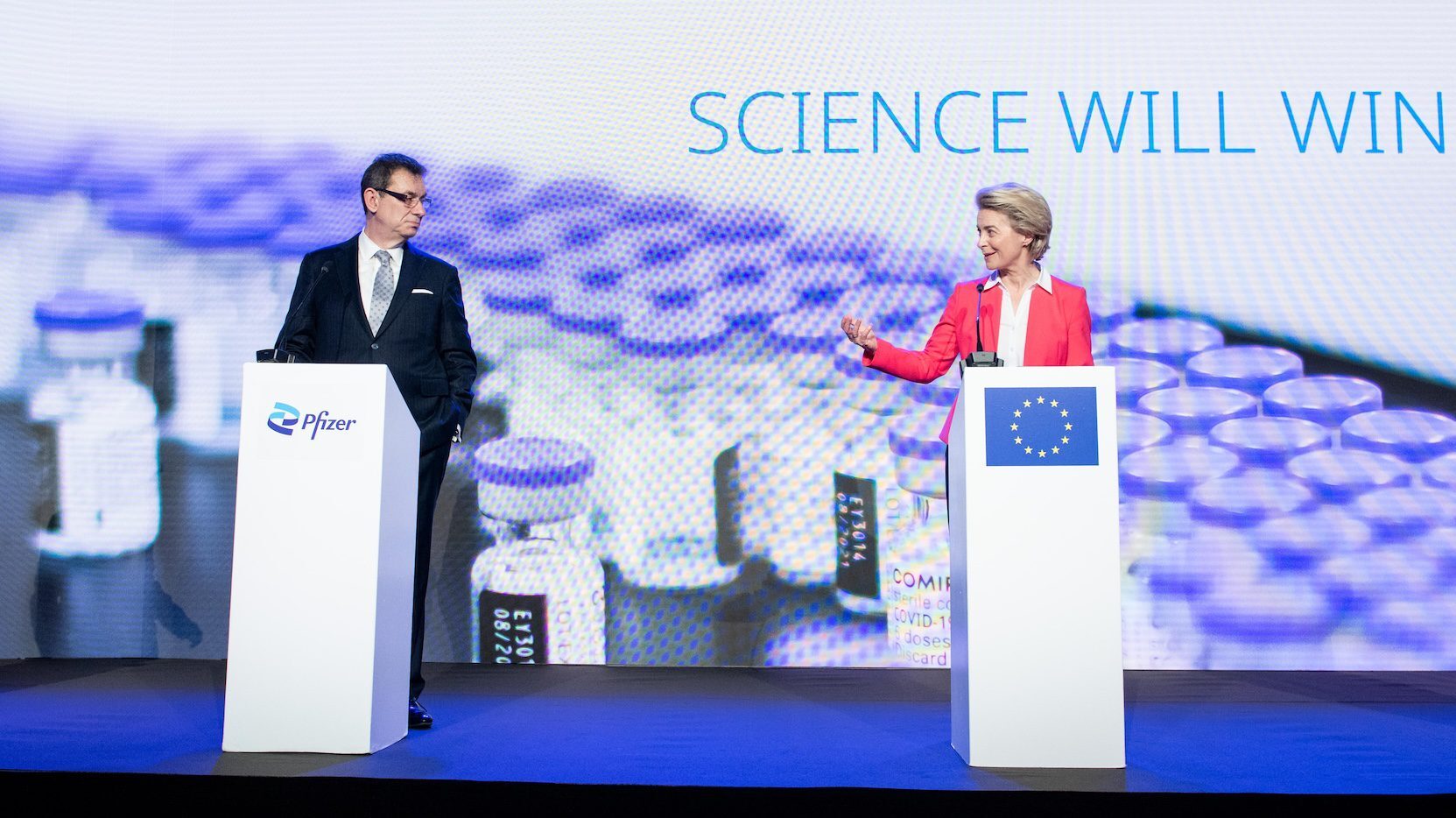
EU Commission President Ursula von der Leyen (right) with Pfizer CEO Albert Bourla (left) in 2021.
Photo: © European Union / EC – Audiovisual Service
It’s no surprise that hardly anyone believes in the EU Commission’s supposed innocence in what’s described as potentially the largest corruption scandal in EU history, as the EU executive is fighting tooth and nail to hide every relevant document from both lawmakers and the general public, even after being ordered by Court of Justice of the EU (CJEU) to release them.
It was revealed earlier this week that the Commission won’t accept the July ruling from the General Court of the EU to release the heavily redacted COVID-19 vaccine contracts after a lawsuit brought by a group of conservative MEPs in 2022. Instead, it appeals to the highest legal authority in the EU, the European Court of Justice (ECJ), hoping it will get a different outcome this time.
The facts that the Commission is trying to hide are how and why it decided to purchase 4.6 billion vaccine doses for less than 450 million residents—over ten doses for every single European—for over €70 billion worth of taxpayers’ funds, only to later discard hundreds of millions redundant and since expired jabs at the very minimum.
🚨In order to protect 🇪🇺 EU budget, it is necessary to immediately terminate contracts for the procurement of #vaccines concluded by the @EU_Commission in the amount of 71 billion €. Today, these contracts are justifiably under criminal investigation by the @EUProsecutor. pic.twitter.com/FIjUIUrEcJ
— Mislav Kolakusic MEP 🇭🇷🇪🇺 (@mislavkolakusic) October 19, 2022
In parallel, the ECJ will also hold hearings in a second case next month, regarding The New York Times’ ‘Pfizergate’ lawsuit which demands freedom of information access to the text messages between EU Commission President Ursula von der Leyen and (her husband’s business partner) Pfizer CEO Albert Bourla. The two unlawfully negotiated the details of one of the EU’s biggest joint procurements that resulted in the EU ordering 1.8 billion doses from Pfizer alone.
Since then, Pfizergate has become von der Leyen’s biggest scandal. But despite the fact that she was repeatedly rebuked by multiple transparency watchdogs, EU agencies, and even the European Ombudsman, the Commission chief keeps ignoring their calls to publish the messages and acts like nothing happened.
Responding to the lawsuit, von der Leyen claimed the texts have been deleted since, which, if true, would also be highly problematic. The full details from both sides will be heard by the Court on November 15th, including if and why the texts have been destroyed. But for the sake of democracy, let’s hope the messages are still recoverable so that the Commission president can be held accountable for whatever she’s trying to hide.
Regarding the classified contracts—not just with Pfizer, but also Moderna, AstraZeneca, and others—the Commission argues that they need to stay out of the public eye to protect the commercial interests of the companies involved as well as the privacy of those officials within the Commission who were responsible for negotiating the procurements.
Quite logically, however, the General Court found both arguments insufficient to maintain the classification. The court instead sided with the lawmakers who brought the lawsuit, saying that the Commission failed to properly explain what “commercial interests” it was trying to protect and that the identity of the officials involved was crucial to determine whether there had been any conflict of interest.
However, the court also recognized that some details might rightfully fall under commercial protection laws when it comes to competing products of different companies, ordering therefore only partial declassification.
“In these cases, the Commission needed to strike a difficult balance between the right of the public, including MEPs, to information, and the legal requirements emanating from the COVID-19 contracts themselves, which could result in claims for damages at the cost of taxpayers’ money,” the General Court said back in July.
Still, the Commission keeps fighting for the ‘right’ to keep every detail away from the public, and it must have a reason for it. It will probably try to pressure the ECJ into a more favorable position—it’s not a coincidence, after all, that the Court waited until after the EU election and von der Leyen’s reelection to publish its ruling. But let’s hope that Europeans will not be sidelined again.
